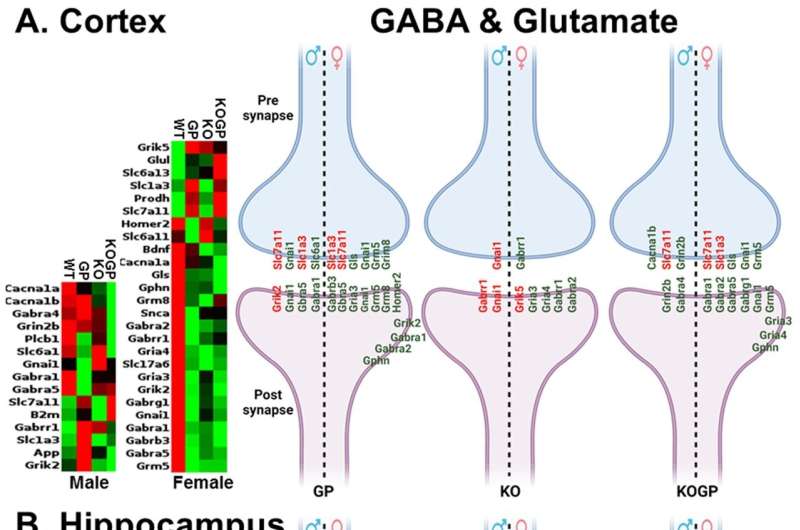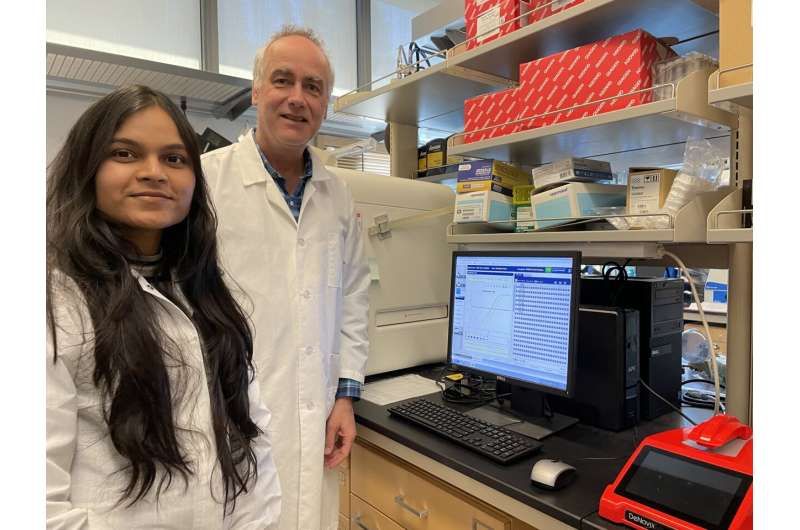This article has been reviewed according to Science X's editorial process and policies. Editors have highlighted the following attributes while ensuring the content's credibility:
fact-checked
peer-reviewed publication
trusted source
proofread
Small protein plays big role in chronic HIV infection

NeuroHIV refers to the effects of HIV infection on the brain or central nervous system, and to some extent, the spinal cord and peripheral nervous system. A collection of diseases, including neuropathy and dementia, neuroHIV can cause problems with memory and thinking and compromise our ability to live a normal life.
Using a mouse model of neuroHIV, a research team led by biomedical scientists at the University of California, Riverside, studied the effects of interferon-β (IFNβ), a small protein involved in cell signaling and integral to the body's natural defense mechanism against viral infections. The researchers found that higher or lower than normal levels of IFNβ affect the brain in a sex-dependent fashion: some changes only occur in females, others only in males.
Marcus Kaul, a professor of biomedical sciences in the School of Medicine who led the study, explained that when infection-induced IFNβ levels become high, the brains of females and males are protected. If IFNβ production in response to infection is absent or too low, HIV can compromise brain function right away in both females and males, he said.
The paper is published in the journal Brain, Behavior, and Immunity.
"However, IFNβ also controls other cell and brain functions," Kaul said. "If IFNβ is absent, females display reduced nerve cell connections called dendrites in the cerebral cortex, while males show diminished 'presynaptic terminals," another type of nerve cell connection, in the hippocampus."
Dendrites are highly branched structures that increase the receptive surface of neurons.
"Paradoxically, in the hippocampus of females and males, the damage to presynaptic terminals by HIV is diminished when IFNβ is absent but the reduction of injury is more pronounced in males," Kaul said.
According to the researchers, the work adds to scientists' understanding of how innate immunity affects the brain during chronic HIV infection.
"Until now, it was not known that normal levels of IFNβ are required for normal memory function and that the absence of IFNβ changes the production of nerve cell components in a sex-dependent fashion," Kaul said.
The findings are noteworthy because the mouse model of neuroHIV that Kaul and his team used shares key features of brain injury and compromised function, such as impaired memory, with people living with HIV infection, or PLWH.
Almost all cells in the body can produce IFNβ. Kaul explained IFNβ regulates the production of inflammatory factors in neuroHIV and has two major effects: (a) it changes the state of a virally infected cell from "normal" to "anti-viral," making the cells uncomfortable environments for the virus, even completely shutting down virus production, and (b) IFNβ is released from infected cells as well as specialized cells that--by sensing infected cells--can alert neighboring cells and the entire body of a viral infection.
"This is how neighboring cells adapt to become more resistant to viral infection," Kaul said. "Some of them will also release additional anti-viral factors and a mixture of other factors that can promote or limit inflammation, such as cytokines called CCL3, CCL4 and CCL5."

The research was performed in Kaul's laboratory. The team generated a new variant of an established transgenic mouse model of neuroHIV by crossbreeding this model with mice that lack IFNβ. The team then analyzed memory function and brain tissue of the transgenic mice for injury that usually occurs in neuroHIV.
"HIV and some other viruses have developed mechanisms to reduce or even prevent the production of more than normal levels of IFNβ," said Hina Singh, an assistant project scientist in Kaul's lab and the first author of the research paper. "We know little about the role of IFNβ in the human brain beyond that it can reduce inflammation. This is a major reason why IFNβ is used to treat multiple sclerosis, an autoimmune disease that affects more than 2.8 million people worldwide. Currently, we have almost no information about how much IFNβ is present in the brains of PLWH and what it does there."
Singh said the study underscores the importance of having normal levels of IFNβ during no viral infection and having sufficiently high levels of IFNβ in case of neuroHIV or other viral infections.
"The body's many anti-viral responses observed in HIV infection are not specific to HIV but also occur with other viral infections," she said. "But in contrast to most other viral infections, the body cannot get rid of HIV, which diminishes the effectiveness of the natural IFNβ response."
Next, the team plans to work on confirming the findings of the neuroHIV model in PLWH.
"For this, we will need to investigate tissues of PLWH who consented to donate them for research after death," Kaul said. "Ultimately, we hope to develop IFNβ into a therapy for patients with neuroHIV."
Second related study
Another study from the Kaul lab alsoo appears in Brain, Behavior, and Immunity.
"This study adds another important aspect to our understanding of how innate immunity and an inflammatory mechanism affects the brain during chronic HIV infection," Kaul said.
The study shows that intact HIV and its viral envelope protein gp120 each cause macrophages, a type of white blood cell, to release cysteinyl leukotrienes, or CysLTs, which are pro-inflammatory mediators. The study shows for the first time that the CysLTs are critical components of macrophage neurotoxicity induced by HIV-1, the most common of the two major types of HIV.
"The potential translational value of our work is the demonstration that an asthma drug approved by the Food and Drug Administration, that inhibits a major receptor for CysLTs also prevents HIV-induced neurotoxicity," Kaul said.
The research paper is titled "A critical role for Macrophage-derived Cysteinyl-Leukotrienes in HIV-1 induced neuronal injury." Nina Yuan, a former associate specialist researcher in the Kaul lab, is the paper's lead author.
More information: Hina Singh et al, Interferon-β deficiency alters brain response to chronic HIV-1 envelope protein exposure in a transgenic model of NeuroHIV, Brain, Behavior, and Immunity (2024). DOI: 10.1016/j.bbi.2024.02.014
Nina Y. Yuan et al, A critical role for Macrophage-derived Cysteinyl-Leukotrienes in HIV-1 induced neuronal injury, Brain, Behavior, and Immunity (2024). DOI: 10.1016/j.bbi.2024.02.023





















